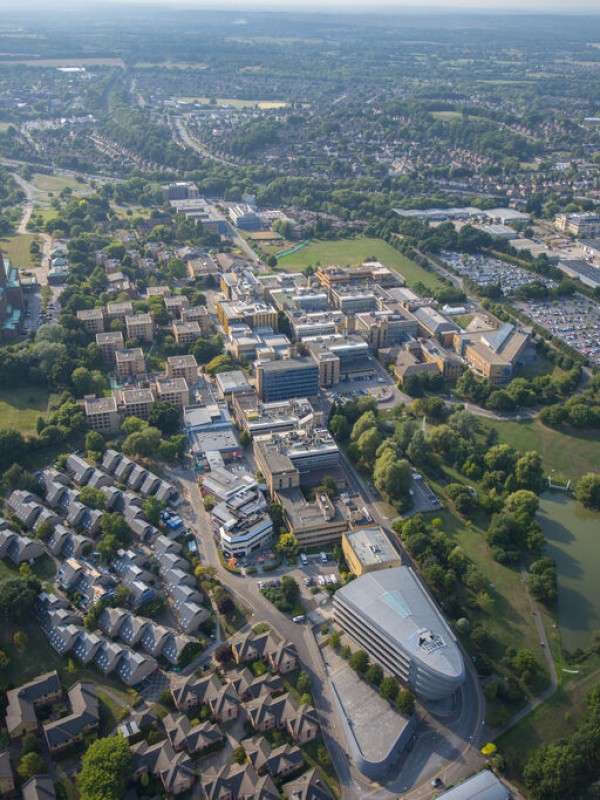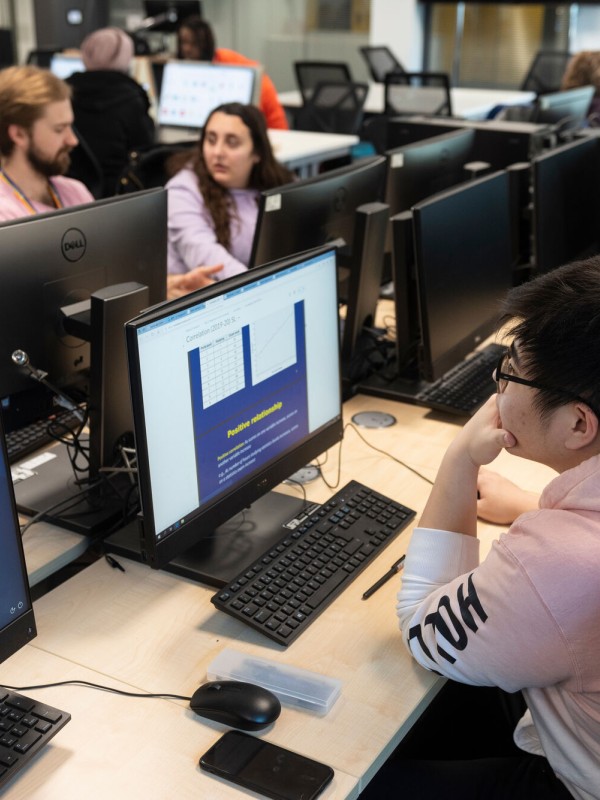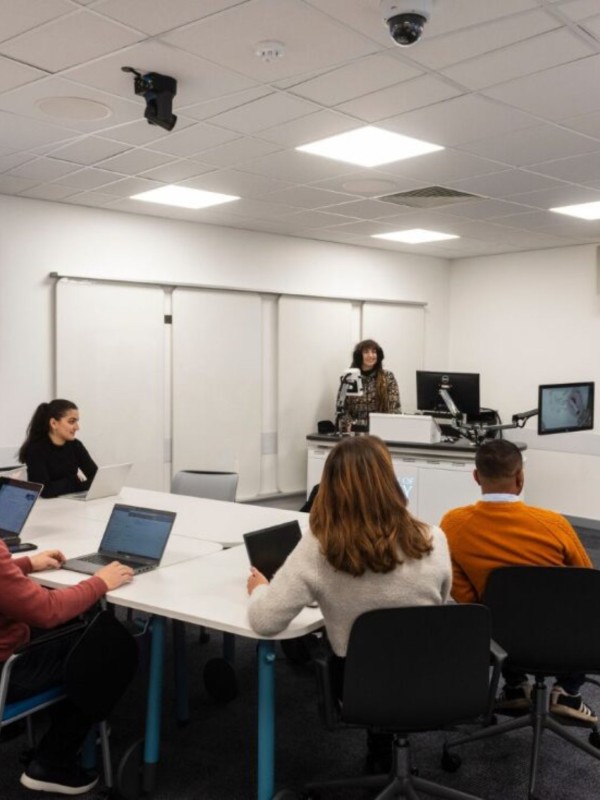
- Economics
MRes — 2026 entry Economics
Our Masters in Research (MRes) provides you with an exciting and rewarding pathway to a PhD. You’ll have the opportunity to undertake a substantial piece of original work which contributes to the field of economics. You’ll develop an expert research mind-set required for a high-profile job in finance or business, or for doctoral studies.
4,138+ people have created a bespoke digital prospectus
Why choose
this course?
- Our MRes Economics is the first year of our doctoral programme followed by the four-year PhD programme.
- It'll provide you with the transferable skills and knowledge to pursue doctoral research in economics and employment as a professional economist in a research environment.
- Alternatively, you can also graduate with a stand-alone MRes degree after one year.
- You’ll learn from academics at the frontier of their research fields, allowing you to develop specialist skills and techniques, in a vibrant research-focused department.
- At Surrey we produce graduates sought-after by leading economics departments, central banks, research institutions, consultancies and think tanks around the world.
Statistics
Fantastic graduate prospects
100% of our economics graduates go on to employment or further study (Graduate Outcomes survey 2025, HESA)
World impacting research
Economics achieved an overall ranking of 6th for real-world impact, 8th for research environment and 10th for world-leading research in REF 2021*
100th in world
For economics and econometrics in the Times Higher Education World University Rankings by Subject 2026
*Research Excellence Framework (REF) 2021
What you will study
You’ll study research-orientated modules in microeconomics, macroeconomics and econometrics at an advanced level, and complete a research project with an MRes dissertation. You’ll gain an advanced understanding of research methods and techniques, enabling you to apply your knowledge to a range of economics problems.
The first semester of the programme will provide you with a solid foundation in modern economics and econometrics. The second semester will introduce you to more advanced topics such as microeconometrics, optimal fiscal and monetary policy, and game theory.
Studentships
If you are considering going on to do a PhD after the MRes course, then we offer generous studentships for the duration of the MRes/PhD course for those with strong research potential, covering:
- All fees
- A yearly stipend (for 2023-24 entry, up to £18,662, TBC for 2025/26)
- A yearly research allowance.
In addition to the yearly research allowance, there are funds available for periods of research abroad, and other research expenses. When you apply, if you require funding, you will automatically be considered for one of our studentships.
Facilities
The University provides our students with leading facilities, including our recently renovated Library and Learning Centre and a range of computer labs across campus.
You'll have access to a designated computer lab including high-performance computing (HPC) facilities, supporting parallel processing and high-memory computational needs. You will also be able to use specialist software and have the chance to work and learn together with your peers.
The MRes dissertation can form the basis for subsequent research towards a PhD Economics course. Writing the MRes dissertation is supported by a dedicated module on research methods, and supervised by academics in Economics.
The Economics MRes is designed to provide the foundation for a subsequent PhD Economics course, during which students take advanced field modules in microeconomics, macroeconomics and econometrics. For further details see our PhD Economics course page.
The structure of our programmes follows clear educational aims that are tailored to each programme. These are all outlined in the programme specifications which include further details such as the learning outcomes:
Modules
Modules listed are indicative, reflecting the information available at the time of publication. Modules are subject to teaching availability, student demand and/or class size caps.
The University operates a credit framework for all taught programmes based on a 15-credit tariff, meaning all modules are comprised of multiples of 15 credits.
Course options
Year 1
Semester 1
Compulsory
This module covers advanced microeconomic concepts which form part of the core knowledge that should enable a student to pursue doctoral research in this area. The material focuses on consumption theory, production theory and general equilibrium in pure exchange. It is an analytical module, focusing on theory but illustrating it with several applications.
View full module detailsThis module gives the students a systematic way of thinking about macroeconomic issues and will cover the basic tools needed to study dynamic macroeconomic models; namely dynamic programming and the solution and stability analysis of linearized models. These tools will then be used to study macroeconomic theories of the business cycle, such as the Real Business Cycle model and the New Keynesian model. A brief overview of software packages Matlab and Dynare will be provided to carry out the numerical solution and simulation of the models.
View full module detailsThe module provides a rigorous treatment of the linear model and tests for linear restrictions, for the case of independent, identical distributed (iid) observation. We then study nonlinear models and tests for nonlinear restrictions, using the Generalized Method of Moment (GMM) estimator as a leading example. Bootstrap counterpart of estimators and tests will be considered. We finally provide an extension to the case of time series data. More precisely, the module provides the analytical tools we need for deriving the limiting distribution of estimators in the context of linear models (OLS and instrumental variables) and nonlinear models (NLS and Generalized Method of Moments). Since in finite sample, asymptotic approximations may be not accurate enough we study how to construct bootstrap critical values, in order to provide more accurate inference.
View full module detailsThe module provides the fundamental mathematical tools used by economists. It will provide the key elements of real analysis and differential calculus. The focus will then be on static optimisation techniques for comparative static analysis and on dynamic optimisation technique for solving dynamic problems.
View full module detailsSemester 2
Compulsory
This module presents key microeconomic concepts which form part of the core knowledge that would enable a student to pursue doctoral research in this field. The material focuses on game theory and information. It presents the four main models in game theory, which consist of static games with complete information, dynamic games with complete information, static games with incomplete information and dynamic games with incomplete information. The treatment will be rigorous, at a suitable pace. Emphasis will be given to economic applications.
View full module detailsThis module introduces students to the tools necessary to address intermediate to advanced topics and perform independent research in such topics. It covers techniques for macroeconomics and it exposes students to research papers and topics. The module also aims to expose students to a wide range of models and approaches, ensuring they are sufficiently familiar with the literature to perform future independent research at the frontier.
View full module detailsThe module builds up over the material covered in Advanced Econometrics 1, and provides an overview of advanced econometric methods that are essential for empirical analysis. Central topics are quantile regression, panel data models, including the most recent developments such as nonlinear panel models and endogenous attrition. The module also introduces students to the statistical tools used in Microeconometrics, such as Binary Choice Models, in the standard case and in the presence of endogeneity, and limited dependent variables, with special focus on Tobit models and sample selection.
View full module detailsThe module provides students with guidance toward their MRes dissertation. Crucial part of this module is the presentation of faculty research. Faculty present their research agenda and their current interest. This has two main purposes. First, students are exposed to frontier research topic in various fields in economics. Second, this facilitates the matching of students and supervisors. Another component of the module consists of a computational/coding course. In addition, there are meetings in which each students presents its preliminary ideas to get feedback from his peers and from module leader.
View full module detailsSemester 1 & 2
Compulsory
This module provides individual student support, feedback and supervision as the foundation for the dissertation and preparing the students for independent research in Economics. The dissertation is an extended report of an independent study that identifies and investigates a particular research question in Economics and explores it systematically and over a sustained period of time. The dissertation provides students with the opportunity to read extensively and apply research skills acquired in taught units to a chosen area of study in Economics. This module builds, in particular, on Research Methods 2, where students develop independent research skills, and prepare a research proposal for the dissertation. For those students who subsequently progress onto the PhD Economics programme the MRes dissertation may also provide a first step towards their subsequent doctoral research.
View full module detailsGeneral course information
Contact hours
Contact hours can vary across our modules. Full details of the contact hours for each module are available from the University of Surrey's module catalogue. See the modules section for more information.
Timetable
New students will receive their personalised timetable during Welcome Week. In later semesters, at least one week before the start of the semester.
Scheduled teaching can take place on any day of the week (Monday – Friday), with part-time classes normally scheduled for one or two days. Wednesday afternoons tend to be for sports and cultural activities.
View our code of practice for the scheduling of teaching and assessment (PDF) for more information.
Location
This course is based at Stag Hill campus. Stag Hill is the University's main campus and where the majority of our courses are taught.
We offer careers information, advice and guidance to all students whilst studying with us, which is extended to our alumni for three years after leaving the University.
The Economics MRes provides a deep understanding of the problems research economists tackle.
Graduates from Economics are sought-after by leading economics departments, business schools and research institutions around the world.
Our PhD students have gone on to academic positions as lecturers and postdoctoral researchers in the UK and overseas, including institutions such as:
- University of Cambridge
- University of Sussex
- University of East Anglia
- European University Institute
- University of Glasgow
- London School of Economics
- University of Texas at Austin.
Our past PhD students have also gone on to take leading positions in international institutions including:
- The International Monetary Fund
- The European Central Bank
- The Organisation for Economic Cooperation and Development
- The Financial Conduct Authority
- The Bank of Canada
- The European Investment Fund
- Leading think tanks and economic consultancy firms.


Catherine Oluwakemi Ojo
Student - Economics MRes


Francisco Nobre
Graduate - Economics MRes
UK qualifications
Typically, applicants are expected to hold an undergraduate degree with first class honours in a relevant discipline, or a masters degree in a relevant discipline (or equivalent qualifications).
A minimum of two referees should be provided with your application. Applicants are also requested to submit a cover letter specifying their motivation to pursue a PhD in Economics at the University of Surrey and highlighting their broad research interests.
GRE criteria
Applicants should also take the GRE exam, unless they have completed a University of Surrey degree or are currently studying with us. Only the Quantitative Reasoning part of the GRE test is compulsory. Applications without evidence of GRE (Quantitative Reasoning) will not be considered.
Please note your GRE exam statement should be less than five years old at the start of the course. You should arrange for an official certificate of your score to be sent to Admissions Services of the University from the Educational Testing Service (ETS), as well as entering your scores in the relevant section of the application form. Please also select the University of Surrey as an official score recipient. The Surrey institution code for the GRE is 3495; no department code is required as the scores are processed centrally. For more information about the test please see the GRE website or the ETS website.
English language requirements
IELTS Academic: 6.5 or above with a minimum of 6.0 in each component (or equivalent).
These are the English language qualifications and levels that we can accept.
If you do not currently meet the level required for your programme, we offer intensive pre-sessional English language courses, designed to take you to the level of English ability and skill required for your studies here.
Selection process
As part of the application assessment process, applicants are usually invited to participate in an interview.
Credit Transfer and Recognition of Prior Learning
We recognise that many students enter their course with valuable knowledge and skills developed through a range of ways.
If this applies to you, the recognition of prior learning process may mean you can join a course without the formal entry requirements, or at a point appropriate to your previous learning and experience.
There are restrictions for some courses and fees may be payable for certain claims. Please contact the Admissions team with any queries.
Scholarships and bursaries
Discover what scholarships and bursaries are available to support your studies.
Fees per year
Explore UKCISA’s website for more information if you are unsure whether you are a UK or overseas student. View the list of fees for all postgraduate courses.
September 2026 - Full-time - 1 year
- UK
- £11,300
- Overseas
- £21,900
- These fees apply to the academic year 2026-27 only. Fees are reviewed annually, and tuition fees may increase for courses running over more than one year.
Payment schedule
- Students with Tuition Fee Loan: the Student Loans Company pay fees in line with their schedule (students on an unstructured self-paced part-time course are not eligible for a Tuition Fee Loan).
- Students without a Tuition Fee Loan: pay their fees either in full at the beginning of the programme or in two instalments as follows:
- 50% payable 10 days after the invoice date (expected to be October/November of each academic year)
- 50% in January of the same academic year.
- Students on part-time programmes where fees are paid on a modular basis: cannot pay fees by instalment.
- Sponsored students: must provide us with valid sponsorship information that covers the period of study.
The exact date(s) will be on invoices.
How to apply
Applications are now open for September 2026 entry. Apply now.
Applications close Friday 10 July 2026.
Admissions information
Once you apply, you can expect to hear back from us within 14 days. This might be with a decision on your application or with a request for further information.
Our code of practice for postgraduate taught admissions explains how the Admissions team considers applications and admits students. Read our postgraduate applicant guidance for more information on applying.
About the University of Surrey
Need more information?
Contact our Admissions team or talk to a current University of Surrey student online.
Terms and conditions
When you accept an offer to study at the University of Surrey, you are agreeing to follow our policies and procedures, student regulations, and terms and conditions.
We provide these terms and conditions at offer stage and are shown again at registration. You will be asked to accept these terms and conditions when you accept the offer made to you.
View our generic registration terms and conditions (PDF) for the 2025/26 academic year, as a guide on what to expect.
Disclaimer
This online prospectus has been published in advance of the academic year to which it applies.
Whilst we have done everything possible to ensure this information is accurate, some changes may happen between publishing and the start of the course.
It is important to check this website for any updates before you apply for a course with us. Read our full disclaimer.











